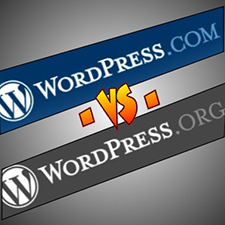
You must be very familiar with the term WordPress, as this is the most popular CMS and publishing tool used by millions of webmasters all over the world. However, do you have any idea about WordPress.com and WordPress.org? Do you know the differences between them? If you have no idea, don’t worry, our editors have comprehensively compared the 2 websites in this article, with a view to helping you understand which site is the good place to go when you want to set up a WordPress powered website.
In below, we firstly show you their essence by making an introduction. Afterwards, we reveal their distinction one by one with concise and clear comparison.
What is WordPress.com?
WordPress.com refers to a managed and shared hosting platform that copes with matters by itself including the security, upgrade and backup for all its users. This platform is created by a company consisting of employees who apply themselves to the development, maintenance and support with which you are able to start WordPress websites without charges.

What is WordPress.org?
Being different with WordPress.com, this one is the center of the WordPress community where you are capable of reaching downloadable software, community support forums, documentation, hosting recommendation, also some free themes and plugins. The key point is that hosting a website using WordPress.org demands you to purchase web hosting service from providers at the very beginning.

Can I Host A Self-Hosted Website with Them?
The answer is positive if you choose WordPress.org that enables you to download the WordPress platform straight from its homepage and complete the installation to wherever you demand.
On the contrary, WordPress.com offers no possibility to create a self-hosted website. Nevertheless, you don’t have to be disappointed because you are allowed to create a free sub domain on WordPress.com that comes with 3 GB of disk space. After the creation of a sub domain, you can get a URL. To be specific, let us take the website HostingReview360.com as an example, it can get a URL like HostingReview360.wordpress.com.
The Pros and Cons of WordPress.com
 WordPress.com is a WordPress hosting service provider, which offers free blog hosting for registered users and is financially supported by paid upgrades. As estimated, there are almost 60 million WordPress.com powered sites with more than 100 million page views each day. And over 1 million new posts and comments are published every day.
WordPress.com is a WordPress hosting service provider, which offers free blog hosting for registered users and is financially supported by paid upgrades. As estimated, there are almost 60 million WordPress.com powered sites with more than 100 million page views each day. And over 1 million new posts and comments are published every day.
Pros
- You can build a new and free WordPress-based site in seconds by signing up a new account and login.
- You only need to focus on your content, and WordPress.com will handle the rest.
- Your site will be integrated with social networking platform by default, like Facebook, Twitter, Tumblr, LinkedIn, and more.
Cons
- WordPress.com only offers 209 WordPress themes, which means the choices are very limited, and you are only able to choose from their list of themes available, which have been used by millions of WordPress.com powered websites.
- You are not allowed to upload the third party themes. If you do need a special theme to make your site become different, you can only purchase the expensive Premium Themes they authorize in their theme marketplace, ranging from about $45 to $100.
- You cannot use plugins in the free plan. If you really want to use plugins to extend the functionality of your site, you have to upgrade your plan, which cost you $166.00 each year.
- You will be given a very unprofessional domain name like yourdomain.wordpress.com. Even if you map the domain you already have to the WordPress.com system, you still have to tell others that your site is powered by WordPress.com.
- They will place ads on your site. If you don’t want to see these ads, you have to pay $30 a year to remove them.
- You site might be terminated without notification if they think you have violated the Terms of Services.
The Pros and Cons of WordPress.org
 WordPress.org is actually the official site of WordPress, which allows you to download and install the latest versions of WordPress, and thousands of plugins and themes. Besides, it is the terrific source for you to learn about WordPress in detail, for it has a large forum full of designers, developers, and professionals all over the world, as well as a tremendous number of articles and tutorials.
WordPress.org is actually the official site of WordPress, which allows you to download and install the latest versions of WordPress, and thousands of plugins and themes. Besides, it is the terrific source for you to learn about WordPress in detail, for it has a large forum full of designers, developers, and professionals all over the world, as well as a tremendous number of articles and tutorials.
Pros
- You are in full control of your website, and are able to do whatever you like with it, such as selling ads space to earn money, and installing a forum component for further interaction with visitors.
- You can install any WordPress plugins and themes you like to extend the functionality and change the layout of your site.
- The Forum and Documentation of WordPress.org offer you the great chances of Do It Yourself, as you can see tons of How To information.
- You are the real owner of your WordPress site, and it is you who decide whether terminate the site or not.
- Almost all the web hosts offering the 1-click WordPress installer such as SimpleScripts, Fantastico, Softaculous, etc. You can have a WordPress site within minutes.
- You can build any kind of website like personal blogs, business portals, discussion boards, galleries, online stores and much more.
Cons
- You need to find a web hosting company to host your WordPress site. The service is usually charged from $3 to $10 each month.
- You are responsible for the spam protection, updates and backups of your website.
- You need the knowledge of FTP and MySQL database creation if you decide to install WordPress manually.
WordPress.org vs WordPress.com – WordPress.org Wins
 It is sometimes confused for beginners whether to choose a self-hosted blog or just create a free blog on WordPress.com. Actually, according to our own real blogging experience, we recommend self-hosted blog rather than WordPress.com due to the many benefits of the former one. In details, the self-hosted bloggers have many other benefits including the following 5 aspects, but not only.
It is sometimes confused for beginners whether to choose a self-hosted blog or just create a free blog on WordPress.com. Actually, according to our own real blogging experience, we recommend self-hosted blog rather than WordPress.com due to the many benefits of the former one. In details, the self-hosted bloggers have many other benefits including the following 5 aspects, but not only.
Customization
The sky of WordPress.org is unlimited with regard to customization. You can download and upload whatever themes you like. If you have gained some knowledge about CSS and PHP coding, you can even create by yourself.
With WordPress.com, however, you are limited to a small number of themes, and cannot make changes to them to reflect your style. And if you want to customize the fonts of your theme or change the color scheme, you have to pay $30 each year.
Themes Support
No one wants to build a website or blog with the same design and layout as others, so you need a unique and stylish WordPress theme to beautify your site, thus stand out from the crowd. As estimated, there are 1,997 awesome themes available at WordPress.org, so you can change the look and appearance of your WordPress website without altering the content and structure. Besides, if you have the knowledge of PHP, HTML & CSS coding, you can also modify your theme or even create a new one by yourself.
Free WordPress.com, however, limits you to a small number of themes (only 211 available now) in its WordPress theme repository, and doesn’t allow you to modify the CSS and other codes within the theme. If you really need to dive into custom CSS to make some explicit changes you want, then you have to pay $30 for CSS upgrades. Besides, you are not allowed to download and utilize the third party WordPress themes.
Plugins Support
 WordPress is famous for its rich plugin collections, which allow you to extend the ability of your site beyond the core installation, such as adding photo galleries, online discussion board, social networking platforms, search engine optimizers, Google sitemaps, and much more. At present, you can download more than 26,000 plugins to tailor your sites with custom functions and features.
WordPress is famous for its rich plugin collections, which allow you to extend the ability of your site beyond the core installation, such as adding photo galleries, online discussion board, social networking platforms, search engine optimizers, Google sitemaps, and much more. At present, you can download more than 26,000 plugins to tailor your sites with custom functions and features.
With WordPress.com, however, you cannot install any paid or free plugins, because there are some plugin-like features installed by default on your website, with some basic functionality like social media, comment section, like box, and reblog button. If you want to get the full control over the plugins of your site, then you need to upgrade your account to WordPress.com Premium program, which cost you $166 each year.
Monetization Freedom
The self-hosted WordPress allows you to do anything with your website, so you can earn some money with it. For instance, you can publish some paid posts concerning about highly specialized techniques, sell services with your own knowledge, join the affiliate programs, sell advertisement spaces and much more. Note that you are the real owner of this site, so you can get 100% of what you have earned. WordPress.com is totally different. You cannot do any monetization; otherwise your site will be banned without any notification.
Functionality
WordPress is well known for the flexibility to extend the functionality of your site with plugins. WordPress.org really shines in this aspect as it offers more than 26,000 plugins for you to choose from, and allows you to upload any third party plugins as you like. WordPress.com only comes with a few basic functionalities like social media, comment section, and recent posts notification. Besides, you are not allowed to use any plugins unless you pay for some money and make a upgrade of your plan.
Search Engine Optimization
 A proper domain name is critical for any WordPress website, so paid web host allows you to have the most SEO domain which is short, keyword-relevant, and with no slashes, letters or numbers. The domain name with WordPress.com, however, is very length and unprofessional, coming with a suffix of wordpress.com all the time.
A proper domain name is critical for any WordPress website, so paid web host allows you to have the most SEO domain which is short, keyword-relevant, and with no slashes, letters or numbers. The domain name with WordPress.com, however, is very length and unprofessional, coming with a suffix of wordpress.com all the time.
Full Control
The account you get from a web host is completely under your control. As long as you are obeying the provider’s rules, you can do whatever you like to the blog and don’t need to worry about that the hosting account might be terminated for unknown reasons. But on WordPress.com, you are probably bothered by the worry because WordPress.com claims in the Terms of Service that it has rights to terminate access to any accounts anytime without notification.
Flexibility
Hosting a self-hosted blog with a good web host, you can feel free to add custom codes or upload files, videos and themes to your blog since you have FTP even SSH access. On the contrary, you will not manage the files of the blog on WordPress.com even if you have paid $13/year for the service of dedicated domain name. Besides, uploading and embedding videos and large sized images in the blog, you have to purchase another service package costs $60/year/blog.
Customizability
As WordPress is the most popular open source CMS, there are thousands of free stylish plug-ins and themes that you can use to extend and customize the blog. But at WordPress.com, you are not allowed to upload any additional plugins or themes. That means, no matter which theme you picked at the platform, it is being used by thousands of other blogs. Otherwise, you have to pay extra $30/ year/blog to get the CSS editor for the flexible customization.
Advertisement
 You have full control to add/remove ADs on a self-hosted blog. If you are choosing a cost-effective web hosting plan, the income of advertisement or links selling may cover all of the hosting expense. This is another highlight of a self-hosted blog that cannot be achieved by any blogs at WordPress.com. For all the free blogs, WordPress.com places ads on them. The only way to eliminate the ads is to purchase the No-Ads upgrade which is $30/year/blog.
You have full control to add/remove ADs on a self-hosted blog. If you are choosing a cost-effective web hosting plan, the income of advertisement or links selling may cover all of the hosting expense. This is another highlight of a self-hosted blog that cannot be achieved by any blogs at WordPress.com. For all the free blogs, WordPress.com places ads on them. The only way to eliminate the ads is to purchase the No-Ads upgrade which is $30/year/blog.
Cheaper Price
It seems that WordPress.com is a cheaper choice since you can get multiple free blogs, but we don’t think that is the truth. Taking those upgrades (which provide the services included in most shared web hosting plans) into consideration, to host a blog on WordPress.com, you have to buy: custom design – $30/year/blog, dedicated domain name – $13/year/blog, no-Ads service package – $30/year/blog and video press – $60/year/blog.
The total cost is up to $133/year/blog that it’s much more expensive than a self-hosted blog. Although a self-hosted blog is more preferred, it doesn’t mean the hosting service offered by different companies weigh the same quality. Therefore, you have to select the most reliable one which can offer you an excellent WordPress hosting experience. Here, we have listed some criteria for you to choose the best WordPress web host:
- Meet the technical requirement of PHP version 5.2.4 or greater, MySQL version 5.0 or greater, and the mod_rewrite Apache module.
- PHP runs as suPHP for increased level of security.
- 1-click WordPress installer included in powerful cPanel control panel.
- Fast page loading speed and at least 99.9% uptime.
- Responsive support team available 24/7 via phone, e-mail, and live chat.
- Best cheap price starting from $3.95/mo if going through this exclusive promotional link.
- Unlimited features including hosting space, email accounts, FTP accounts and hosted websites.
- 1-click installation of 280+ applications including multiple blogging software such as WordPress and b2evolution.
- Free no-downtime transfer from WordPress.com.
- 1 free domain name & free site builder w/ customizable templates.
- 24×7 professional technical support via toll-free telephone, live chat and email.
Having strictly followed the criteria above and reviewed thousands of excellent web hosts specializing in blog hosting, we recommend the most reputable BlueHost here. The main reasons are as following.
















